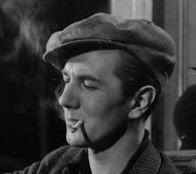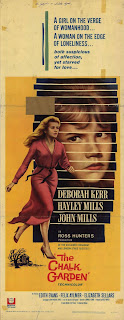First off it was to see a little-seen Michael Redgrave film from 1939 A WINDOW IN LONDON directed by Herbert Mason. I had not heard of the film - it doesn't even rate a mention in Alan Strachan's biography of the actor - but it turned out to be an intriguing little gem.
 It's quite remarkable to consider how quickly Redgrave had established himself - A WINDOW IN LONDON was filmed only five years after he made his professional stage debut and in that time he had become a star of classical revivals with seasons at Tyrone Guthrie's Old Vic and with John Gielgud's company at the Queens Theatre.
It's quite remarkable to consider how quickly Redgrave had established himself - A WINDOW IN LONDON was filmed only five years after he made his professional stage debut and in that time he had become a star of classical revivals with seasons at Tyrone Guthrie's Old Vic and with John Gielgud's company at the Queens Theatre.He had left Gielgud's season early to make his film debut starring in Hitchcock's 1938 classic thriller THE LADY VANISHES and his film career took off immediately - in 1939, the year he made A WINDOW IN LONDON, he also starred in two Carol Reed films: CLIMBING HIGH with Jessie Matthews and THE STARS LOOK DOWN with Margaret Lockwood as well as A STOLEN LIFE with Elisabeth Bergner. Oh and starred in the premiere production of T.S. Eliot's THE FAMILY REUNION... and all this while aged 31.
 In A WINDOW TO LONDON, he plays Peter, a crane operator working on the building of the new Waterloo Bridge. His wife Pat (Patricia Roc) is a night-time switchboard operator in Dolphin Square so they hardly see each other. One morning when his tube train goes overground, he sees a man stabbing a woman through an open window. He races to the house with a handy policeman to discover what Peter saw was an illusionist Zoltini (Paul Lukas) practising a trick with his wife Vivienne (Sally Gray) who is also his glamorous assistant.
In A WINDOW TO LONDON, he plays Peter, a crane operator working on the building of the new Waterloo Bridge. His wife Pat (Patricia Roc) is a night-time switchboard operator in Dolphin Square so they hardly see each other. One morning when his tube train goes overground, he sees a man stabbing a woman through an open window. He races to the house with a handy policeman to discover what Peter saw was an illusionist Zoltini (Paul Lukas) practising a trick with his wife Vivienne (Sally Gray) who is also his glamorous assistant.The press report the incident and Vivienne's smarmy agent friend manages to get them a booking through the resultant publicity but Zoltini's hair-trigger jealousy leads to yet another argument and she storms out midway through the act - straight into Peter who has come to see their act. Needing an escape from the world, Peter takes her - ahem - up the crane and he gives way to her sultry charms. She takes him to a swanky party at the agent friend's apartment but finds she has left her bag at the crane. The obliging Peter goes to fetch it only to find the vengeful Zoltini waiting for him...
 Peter and Zoltini have fistycuffs which results in Zoltini's plunge from the bridge. What now for our hapless hero? Will Peter face the gallows for murder? What of his marriage now he is under the spell of Vivienne? There are two more neat twists to the plot before all is resolved.
Peter and Zoltini have fistycuffs which results in Zoltini's plunge from the bridge. What now for our hapless hero? Will Peter face the gallows for murder? What of his marriage now he is under the spell of Vivienne? There are two more neat twists to the plot before all is resolved.Although the characters become little more than pawns to the screenwriter's fevered plotting, the winning performances of the four leads have won you over as their lives spiral out of contro
 l and keep you onside despite the twists and turns of the last act. Patricia Roc is a trifle insipid as the nice girl but Mason wisely concentrates on Redgrave, Lukas and in particular Sally Gray in the main. Sally Gray makes a memorable femme fatale and one can quite imagine how the sex-starved Peter would fall for her sultry charms. It's a shame she is not as well-known as she should be.
l and keep you onside despite the twists and turns of the last act. Patricia Roc is a trifle insipid as the nice girl but Mason wisely concentrates on Redgrave, Lukas and in particular Sally Gray in the main. Sally Gray makes a memorable femme fatale and one can quite imagine how the sex-starved Peter would fall for her sultry charms. It's a shame she is not as well-known as she should be.The film has a wealth of London locations and it was intriguing to see the building of Waterloo Bridge with the open vistas on each side of the Thames. The film was shown with a 1944 short film LONDON TERMINUS which covered a day at Waterloo Station. It was quite fascinating seeing the main concourse looking not that different from it does today but to see little details lost to us now such as the timetable being changed by a long pole closing the wooden slats with the names written on them and the surprise of seeing a news cinema inside the concourse. It made for a hugely enjoyable Friday evening double-bill.
The second trip was to see Ronald Neame's 1963 screen version of Enid Bagnold's play THE CHALK GARDEN which had the all-star cast of Deborah Kerr, John & Hayley Mills and Edith Evans.
 Bagnold's play - which was given such a memorable production at the Donmar in 2008 - was adapted by John Michael Hayes (who wrote the screenplays for four Hitchcock films including REAR WINDOW) but very little of what makes the play so remarkable remains in the film. Where the play is primarily about the war of wills between the eccentric but formidable Mrs. St. Maugham and the governess she has employed to manage her wilful grand-daughter Laurel, the film moves the focus to the governess Miss Madrigal and Laurel thus making it an amiable teen rights-of-passage film instead of something deeper.
Bagnold's play - which was given such a memorable production at the Donmar in 2008 - was adapted by John Michael Hayes (who wrote the screenplays for four Hitchcock films including REAR WINDOW) but very little of what makes the play so remarkable remains in the film. Where the play is primarily about the war of wills between the eccentric but formidable Mrs. St. Maugham and the governess she has employed to manage her wilful grand-daughter Laurel, the film moves the focus to the governess Miss Madrigal and Laurel thus making it an amiable teen rights-of-passage film instead of something deeper.
It's not that the performances are at fault although I have never been a particular fan of either Kerr or John Mills. Edith Evans deserved her Academy Award nomination for her stately performance and Hayley Mills shows that she was a child actress who really could hold her own against the best adult performers. It's not even that the film itself is bad - Ronald Neame's direction is measured and manages to sustain the underlying tension as to what is the secret of Miss Madrigal's past. It's just a bit smothered by the standard Ross Hunter high-gloss production.
It's just a letdown that the play could not have been adhered to more - Edith Evans would probably have won the Academy Award if the adaptation had included Mrs. St. Maugham's final showdown with her daughter who arrives to take back her daughter.
The screening was introduced by Julie Harris who designed the costumes for the film. Now in her late eighties, it was a delight to hear her recollections on the making of the film and a quick shufty at her filmography shows that her next two films were A HARD DAY'S NIGHT and CARRY ON CLEO - how versatile can you get!
No comments:
Post a Comment